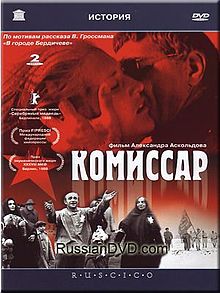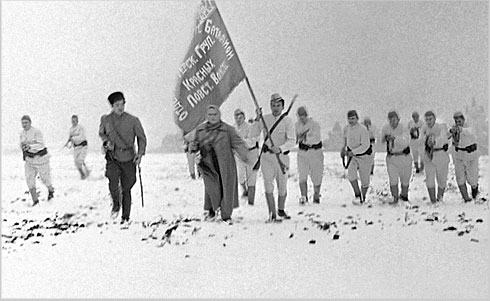29 January 2014
Premiered in 1988, released in 1967 and depicting 1917… Commissar is quite the film!
The setting is a jewish town amidst the cold war between the Red and White armies. Nonna Mordukova plays a commissar within the brutal and ferocious red army. She, merciless and tough, has the complete respect of her troop. The movie starts by showing how she gives one man a “tribunal” for selling secrets in exchange for a skirt. The tribunal, of course, served bullets in place of justice.
How tough she must be to gain the respect of these men! She serves “tribunals” and even tried to serve one to her unborn child. When she knows she has to raise this child, she appears to be devastated. However, we start to see that this tough outer shell slips on and off as easily as her uniform.
Throughout the film, she grows attached to the family and really loves her son, after he is born. As she is giving birth, one of the memories she conjures is of the father of her son; clearly, it meant more to her than just being some fling. We see her softening and once she trades the uniform for the dress, she takes on her softer side. Interestingly, the jewish family made the dress for her. This perhaps symbolized how they were the ones to help soften her up and show her love.
The family, themselves, had an interesting dynamic. Compared to the other films we have viewed in the class, this family did not appear dysfunctional. The mother and father still loved each other and despite their circumstances were happy. The father sang on his way to work and the mother, Maria, enjoyed the children with all the patience in the world. The film really conveyed that these people, the Jewish people, were very decent human beings.
What then, of the Russian people? The brutality of the red army… The antisemitism of the white army… and then end of the film. At the end, the commissar abandons her son to join the army, once more. After imagining herself joining the jews in concentration camps as a result of a white victory, she realizes she cannot be idle. Did she leave to help the red army beat the white army to make sure this vision never came true because she cared so much about her new family? Or, did she leave because she wanted to escape this dreadful fate? The father of the family, played by Rolan Bykov, is also left wondering what kind of people these Russians are.
There is evidence to believe that the commissar is not so cruel as to run for her own sake. As she left her son, she told him to remember her and the name of his father. She made it seem like she truly believed that he would have a future. She also knew that this family would care for her son. They would not abandon him. She put on her uniform and marched to meet her troops. She once again put on her shell so that she could do the task, at hand. The final scene is her leading the red army into the heart of battle.
The film seems to send the message: the only way to protect our children and secure our future is to sacrifice ourselves for the cause.


